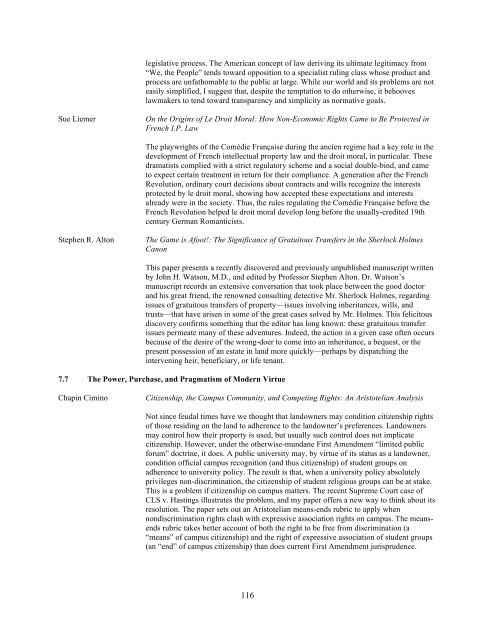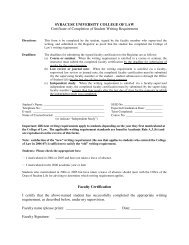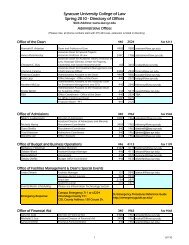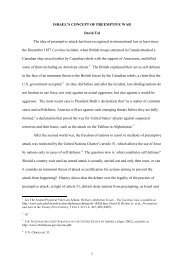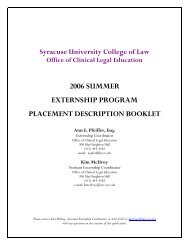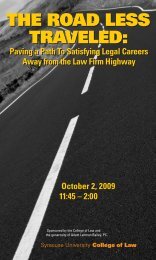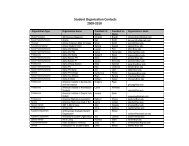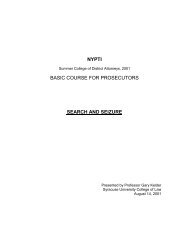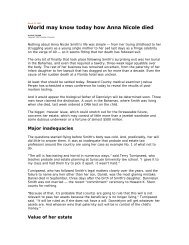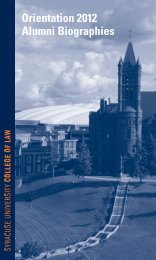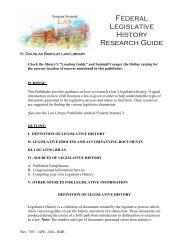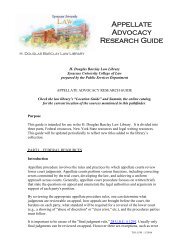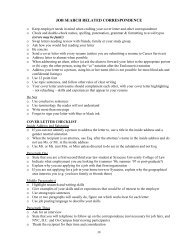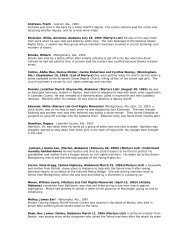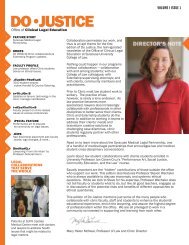2011 Conference Program (PDF) - Syracuse University College of Law
2011 Conference Program (PDF) - Syracuse University College of Law
2011 Conference Program (PDF) - Syracuse University College of Law
Create successful ePaper yourself
Turn your PDF publications into a flip-book with our unique Google optimized e-Paper software.
legislative process. The American concept <strong>of</strong> law deriving its ultimate legitimacy from<br />
“We, the People” tends toward opposition to a specialist ruling class whose product and<br />
process are unfathomable to the public at large. While our world and its problems are not<br />
easily simplified, I suggest that, despite the temptation to do otherwise, it behooves<br />
lawmakers to tend toward transparency and simplicity as normative goals.<br />
Sue Liemer<br />
On the Origins <strong>of</strong> Le Droit Moral: How Non-Economic Rights Came to Be Protected in<br />
French I.P. <strong>Law</strong><br />
The playwrights <strong>of</strong> the Comédie Française during the ancien regime had a key role in the<br />
development <strong>of</strong> French intellectual property law and the droit moral, in particular. These<br />
dramatists complied with a strict regulatory scheme and a social double-bind, and came<br />
to expect certain treatment in return for their compliance. A generation after the French<br />
Revolution, ordinary court decisions about contracts and wills recognize the interests<br />
protected by le droit moral, showing how accepted these expectations and interests<br />
already were in the society. Thus, the rules regulating the Comédie Française before the<br />
French Revolution helped le droit moral develop long before the usually-credited 19th<br />
century German Romanticists.<br />
Stephen R. Alton<br />
The Game is Afoot!: The Significance <strong>of</strong> Gratuitous Transfers in the Sherlock Holmes<br />
Canon<br />
This paper presents a recently discovered and previously unpublished manuscript written<br />
by John H. Watson, M.D., and edited by Pr<strong>of</strong>essor Stephen Alton. Dr. Watson’s<br />
manuscript records an extensive conversation that took place between the good doctor<br />
and his great friend, the renowned consulting detective Mr. Sherlock Holmes, regarding<br />
issues <strong>of</strong> gratuitous transfers <strong>of</strong> property—issues involving inheritances, wills, and<br />
trusts—that have arisen in some <strong>of</strong> the great cases solved by Mr. Holmes. This felicitous<br />
discovery confirms something that the editor has long known: these gratuitous transfer<br />
issues permeate many <strong>of</strong> these adventures. Indeed, the action in a given case <strong>of</strong>ten occurs<br />
because <strong>of</strong> the desire <strong>of</strong> the wrong-doer to come into an inheritance, a bequest, or the<br />
present possession <strong>of</strong> an estate in land more quickly—perhaps by dispatching the<br />
intervening heir, beneficiary, or life tenant.<br />
7.7 The Power, Purchase, and Pragmatism <strong>of</strong> Modern Virtue<br />
Chapin Cimino<br />
Citizenship, the Campus Community, and Competing Rights: An Aristotelian Analysis<br />
Not since feudal times have we thought that landowners may condition citizenship rights<br />
<strong>of</strong> those residing on the land to adherence to the landowner’s preferences. Landowners<br />
may control how their property is used, but usually such control does not implicate<br />
citizenship. However, under the otherwise-mundane First Amendment “limited public<br />
forum” doctrine, it does. A public university may, by virtue <strong>of</strong> its status as a landowner,<br />
condition <strong>of</strong>ficial campus recognition (and thus citizenship) <strong>of</strong> student groups on<br />
adherence to university policy. The result is that, when a university policy absolutely<br />
privileges non-discrimination, the citizenship <strong>of</strong> student religious groups can be at stake.<br />
This is a problem if citizenship on campus matters. The recent Supreme Court case <strong>of</strong><br />
CLS v. Hastings illustrates the problem, and my paper <strong>of</strong>fers a new way to think about its<br />
resolution. The paper sets out an Aristotelian means-ends rubric to apply when<br />
nondiscrimination rights clash with expressive association rights on campus. The meansends<br />
rubric takes better account <strong>of</strong> both the right to be free from discrimination (a<br />
“means” <strong>of</strong> campus citizenship) and the right <strong>of</strong> expressive association <strong>of</strong> student groups<br />
(an “end” <strong>of</strong> campus citizenship) than does current First Amendment jurisprudence.<br />
!<br />
116


